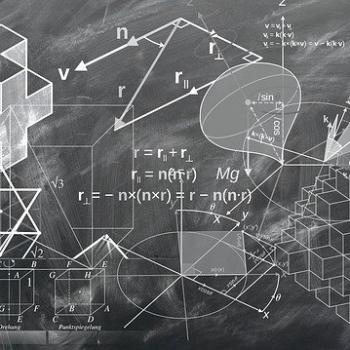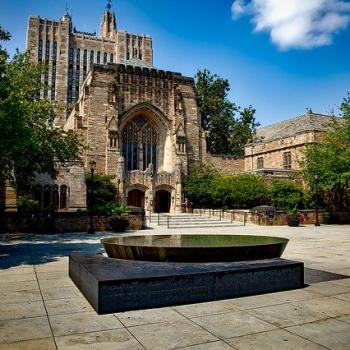 In the last month or so, I’ve come across a number of excellent essays on a common theme: the realm of English literature, in both the academy and the marketplace, is imploding.
In the last month or so, I’ve come across a number of excellent essays on a common theme: the realm of English literature, in both the academy and the marketplace, is imploding.
On the academic front, the Chronicle of Higher Education, the leading trade publication for universities and faculty, released a package of essays entitled “Endgame” centered around the thesis that “the academic study of literature is no longer on the verge of field collapse. It’s in the midst of it. . . . Practitioners, especially those who advise graduate students, must face the uneasy possibility that their professional function has evaporated.” Laura Baudot has noted how the formal discipline of literary criticism, hamstrung by its own prohibitions on treating characters as real people, struggles to make itself relevant to human life at all: “What is the purpose of the academic study of literature? I was not sure any more. As I stood before my undergraduate students, I had never felt more filled with love for what I do, nor more uncertain about how to do it.” Jon Baskin goes further, remarking that “the hatred of literature, though it remains almost unheard of among the general reading public, has become the default mode in the upper reaches of our literary culture.” The possibility of sheer exultation in prose or poetry is denied: all that matters is the utilitarian deployment of literary works as “touchstones in cultural conversations.”
On the business side, Adam O’Fallon Price argues in The Millions that much of what passes for contemporary literary fiction refuses to depict and engage moral choice at all, instead preferring to keep characters suspended in glum, predecisional limbo. And then, of course, there’s the peripheral but related debate over who gets to tell stories at all, exemplified by the devolution of young-adult publishing into a cancel-culture morass and the brouhaha over Jeanine Cummings’s immigrant-themed novel American Dirt (spoiler: it was a mediocre potboiler that didn’t deserve all the coverage).
My general sense is that we’re at something of a cultural tipping point. The professoriate seems incapable of mounting any defense of its own discipline. Student enrollments are dropping. Some universities, prioritizing technical skills, have already floated the idea of eliminating their English departments altogether. The necessary condition of good literature—the ability to enter into and depict the life of another person—has now been problematized, to the point that authors of color are (in a hideous irony) denied the right to write about subjects other than their own identities. This is not a healthy status quo.
And that breaks my heart, because literature was always my first love. Up until the middle of high school, I planned to study English in college and become a professional writer. (Yes, I’m a sellout.) Reading—and writing—fiction gives me a kind of joy that nothing else does.
But the unfolding tragedy in the field leads me to ask the same question that the field itself is confronting. What is distinctive about the love of literature in itself, as a discrete domain of thought and study, wholly apart from literature-adjacent issues like questions of structure and syntax (linguists’ turf), historical context (historians’ turf), intellectual underpinnings (philosophers’ turf) and so on? What is the je ne sais quoi that must underpin participation in the field?
Here’s my stab at an answer to that question, along with some thoughts on how it connects to the current moment. I’m certainly no professional, but at least I can say that my childhood joy in books has not died away with age, and I think it’s worth asking why that is.
The way I see it, at the heart of all literature is an element of mystery. I don’t mean “mystery” in the whodunit sense: I mean the ever-present intuition that something unexpected or unpredictable may be at hand. In a thriller built around its plot, the element of mystery is obvious: the reader wants to know what happens next. But the mystery takes different shapes in other contexts. In a character-driven novel, for instance, the mystery is grounded in what we don’t yet know about the protagonist we’re following. Or, in a work of literary fiction, the mystery turns on how the author will use words in new, provocative, beautiful, and different ways. This is particularly key: good literature enriches our experience by giving us the tools—words and uses of words—to see features of the world we’ve never before learned to see.
If the Inuit really do have, as the story goes, fifty different words for “snow,” the wintry world they inhabit is conceptually far richer than the world we English-speakers would encounter if we stepped into their environment. What may look like an undifferentiated expanse of whiteness to us is, on the Inuit account, always nuanced by subtle differences that the trained eye has learned to perceive. The Inuit have learned to see things in snow that we cannot, and their language ensures that future generations can partake in that knowledge.
Put another way, if the world of our experience is a diamond, the words and phrases we use to describe that world are individual facets of that diamond. As more and more facets emerge—as words are used in ways they’ve never before been used—the world transforms into a dazzling, coruscating landscape of wonder, opening up new possibilities of thinking and speaking and seeing. And most joyously, this process is theoretically infinite: there is no upper limit to literary beauty.
In the broadest sense, the act of writing is an unveiling of truth, but always only a partial unveiling—at every turn there is the possibility that more might be be described, thought, depicted, manifested. Though not everyone might use this particular formulation, I’d venture that this love for the mystery goes a long way toward explaining why the average literature aficionado finds the interplay of words so compelling.
This is why attempts to strip away the personal from the study of literature are destined to fail. When one encounters a mystery, one wants to “proceed further into”’ that mystery, to open up the horizon of intelligibility a little more. One wants to see how words can be stretched in new and different ways to elaborate the manifold dimensions of experience. One wants to walk alongside a character and understand the alien landscape of their mind. In short, there’s no way to excise the ever-present element of individual desire from the study of literature—at least without forcing the direction of the field away from what so many people originally find compelling.
Faddish professional approaches to literary study that shut down the possibility of thinking of characters as real people, or that collapse all uses of words into Foucaldian “discourses of power,” are inherently joyless. On this view, the desire to enter the mystery of literature—to be drawn to words and to celebrate their ability to illuminate the world—becomes pathologized as an attempt to wield the machinery of discursive power. Criticism becomes not a contemplative process of examining the facets of beauty that are elaborated in the text, but an interrogative attempt to destabilize or repurpose the text.
This is a process destined to bottom out. It cannot hope to attract lovers of literature for very long, because it intends to turn them into their opposites. Nor can it justify itself in utilitarian terms, since criticism for its own sake swiftly becomes bludgeoning and pedantic rather than constructive.
But it need not be so. The first step to reconstruction might be an acknowledgement of the possibility of literary innocence—the notion that perhaps, just perhaps, words are not always deployed as tools of manipulation, but sometimes penned simply for the love of transcendent beauty. To be sure, no writer stands outside their historical-political moment, but some have proven capable of creating works that endure beyond it.
That, in turn, raises a second issue. On the other side of the spectrum from the avant-garde is a certain “conservative” approach to literature that—at least in my experience—rejects modern critical trends to a nearly obsessive degree. This school of thought (again, speaking anecdotally) generally tends to pooh-pooh any book written after 1940 or so as woefully inferior to the “classics” that came before.
This mentality is not conservative, but reactionary. There is no reason to presume a priori that all the Great Books, however one defines them, have already been written. Worse, a refusal to treat the literary canon as “open at one end” reflects a lack of love for the essential mystery at the heart of literature—the possibility that stories may be told, or words used, in ways we’ve never before encountered. (Anyone who declines on principle to read David Mitchell, David Foster Wallace, or Don DeLillo is missing out, big time.) The answer to the current crisis is not a retreat to a beloved redoubt, but a reexamination of first principles.
Much more could be said about the future of English literature in an increasingly fragmented, technology-addled time. In the near term, I predict the enrollment decline will continue, and the shuttering of university English departments will accelerate. But what won’t happen—either a year from now or a century from now—is the loss of that instinctual love for literature that we first acquire as children and (hopefully) preserve into adulthood. The mystery will always be calling us, whether or not we have the conceptual grammar to articulate it.












